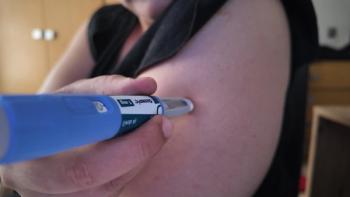
Clear Masks Improve Care, Build Trust for Hearing-Impaired Patients
When patients rely on lip-reading to communicate, mask mandates have major effects on their care.
The COVID-19 pandemic has added significant challenges to individuals who are hearing impaired – about 15% of the American population, and a third (33%) of the population over the age of 65 – as mask mandates make it so that they can no longer rely on lip-reading.
“Hearing-impaired patients have reported frustration, isolation, and fear as a result of being unable to understand and communicate with their providers in hospital settings. In addition, impaired patient-caregiver communication is a safety issue, as patients with communication barriers are 3 times more likely than those without to experience adverse events in acute care settings,” Brianna DiTullio, RN, BSN, a nurse at Memorial Sloan Kettering Cancer Center said.
DiTullio’s research, which was presented at the 46th Annual Oncology Nursing Society Congress, found that clear face masks can decrease these communication barriers and increase trust between clinicians and patients with cancer who are hearing impaired.
She was originally inspired to conduct this research when a partially deaf patient – she called him John – was at MSK’s bone marrow transplant unit in 2019. He was immunocompromised and on neutropenia precautions, so everyone in his room had to wear a mask.
“Given that lip reading is impossible to do through a traditional face mask, he essentially lost his ability to communicate every day during rounds with the transplant team,” DiTullio said. “I would watch him nod his head along with the conversation as 5 or 6 masked doctors talked to him about his symptoms and his plan of care. But as soon as the team left, he would admit that they didn’t really understand most of what was being said.”
The pilot project involved 6 patients who were hearing impaired and 12 staff members (nurses, patient care technicians, doctors, occupational and physical therapists) who used clear face masks over a 2-day trial period. Ultimately, there was a major difference in patient understanding and trust as a result of the clear masks.
Before the clear masks, 67% of patients reported that they often have difficulty understanding what staff is saying through the masks, and 33% said that they almost always face this issue. After the new masks were implemented, a third (33%) of patients said that they never have issues understanding what staff is telling them. Seventeen percent reported rarely facing this issue, 17% reported sometimes facing it, and 33% reported often facing it.
The clear masks also increased the amount of communication between patients and their providers. At baseline, 50% of patients reported that they almost always have conversations with hospital staff while they are wearing masks, and after the clear masks were implemented, this number increased to 83%, with the rest of participants (17%) reporting that they often have conversations with hospital staff.
“Anecdotally, patients loved that they could now see the faces of the staff caring for them, point out that they could now see their smiles,” DiTullio said.
Finally, the clear masks improved trust between patients and providers. Before they were implemented, 34% of participants said that they were neutral/unsure of their trust levels for hospital staff, 33% were trusting, and 33% were extremely trusting. After 2 days with clear masks, 67% of participants said that they were extremely trusting of the staff, and 33% said that they were trusting. Of note, after the clear masks were used, no patients reported being neutral/unsure.
DiTullio recommended that hospitals invest in clear face masks to better communicate with this patient population.
“While this project was originally carried out in a pre-COVID-19 setting, it now has much more far-reaching implications,” DiTullio said. “Health facilities have a responsibility o accommodate the specialized needs of patient populations they care for, just like how they provide interpreter services for non-English—speaking patients. The hearing-impaired population nis no different.”
Reference
DiTullio B. Clear-faced masks for hearing-impaired patients. Presented at: 46th Annual ONS Annual Congress. April 20, 22, 27, 29, 2021.
Newsletter
Knowledge is power. Don’t miss the most recent breakthroughs in cancer care.


































